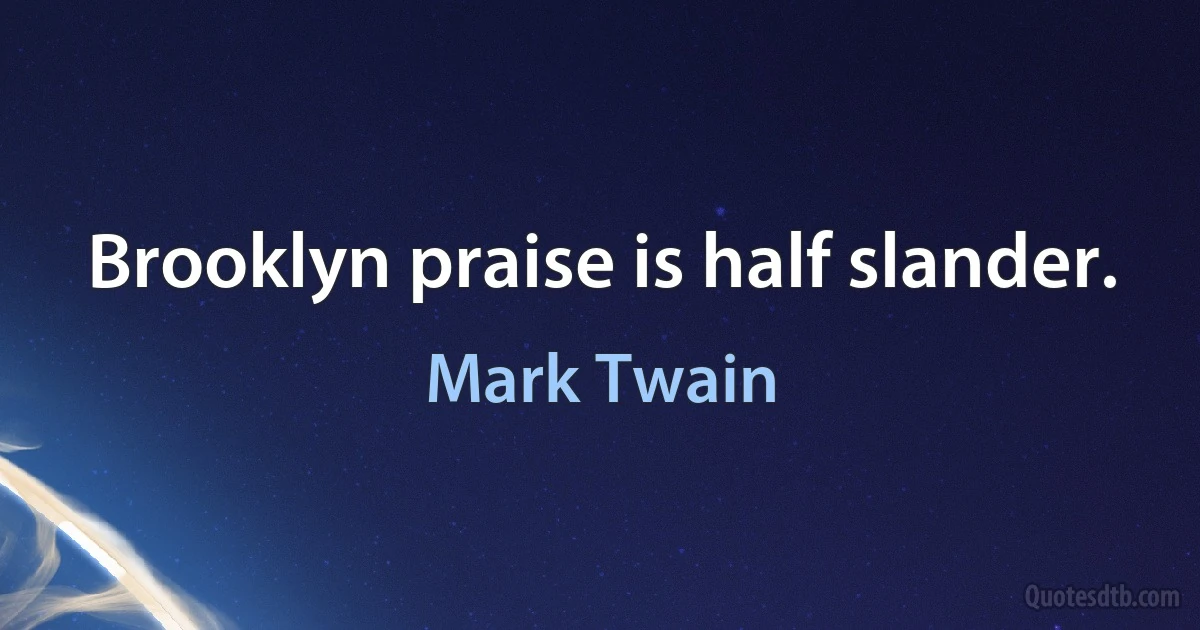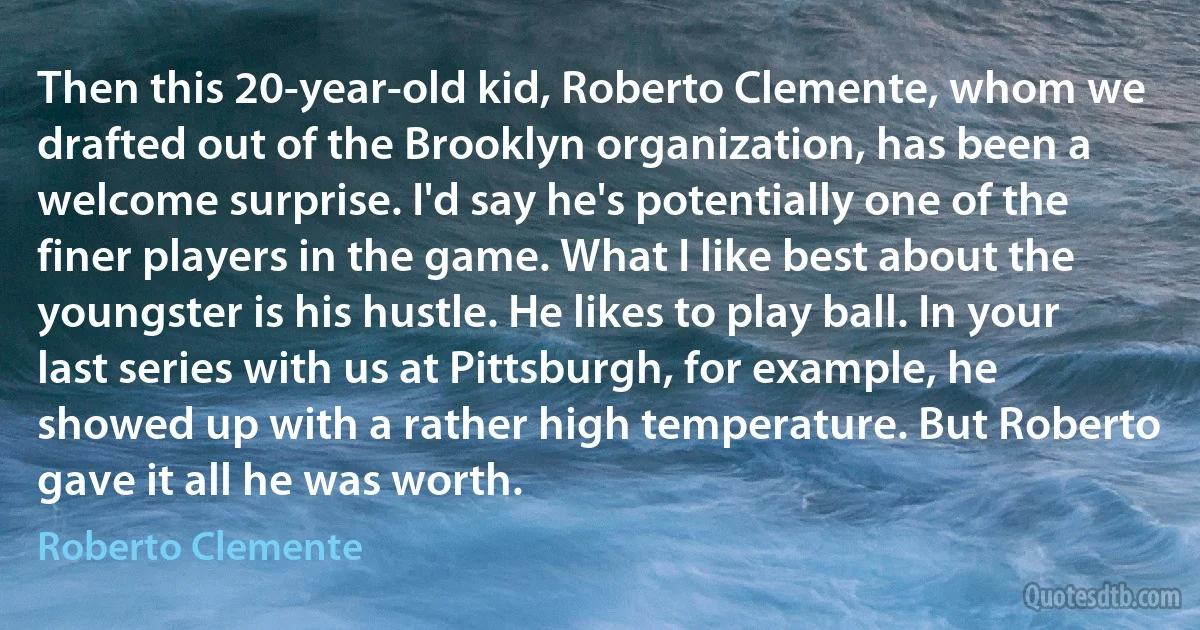Brooklyn Quotes - page 8
Brooklyn born, Bronx bred... I felt like the dreamer/day tripper of the neighborhood with a vivid imagination and a longing to transcend the mundane through my love of the arts. My mother inspired me a lot. I can remember growing up hearing her voice in the background on the phone urging others to stop putting up with abuse and to stand up for themselves in order to better their lot in life. She was always helping people – mostly other women – liberate themselves from oppressive relationships whether it was at home or work.

Esai Morales
I recall the telegram I received at the time of our first Congress from an ordinary woman in Brooklyn. It was short: "Thank you on behalf of the children."
As adults we are obliged to avert transformation of the Earth from a flourishing planet into a heap of smoking ruins. Our duty is to hand it over to our successors in a better state than it was inherited by us. Therefore, it is not for fame, but for the happiness and for the future of all mothers and children that we - the International Physicians for the Prevention of Nuclear War - have worked, are working and will work.

Yevgeniy Chazov
I would spend a nickel on the subway and go arbitrarily to some other stop and look around there. So I was roaming the city in the afternoons and applying for jobs in the morning. And one day I found myself in a neighborhood I just liked so much...it was one of those times I had put a nickel in and just invested something. And where did I get out? I just liked the sound of the name: Christopher Street - so I got out at Christopher Street, and I was enchanted with this neighborhood, and walked around it all afternoon and then I rushed back to Brooklyn. And I said, "Betty I found out where we have to live."

Jane Jacobs
Nevertheless, as readers familiar with Mr. Lerner's previous works know, the range of his interests is amazing. In this book he comments on such diverse matters as President Truman's handling of the 1946 railroad strike..., Charlie Chaplin's superb ability as a mime, H. G. Wells's imaginative writing, Palestine, the cold war, Trotsky and Stalin, the evil of the Ku Klux Klan, Jim Crowism, the 1948 political conventions, and the management of the Brooklyn Dodgers. In all of these and the many other pieces which make up the book the Enemy is always Status Quo.

Max Lerner
Now everything has changed, and everybody knows it except the clergy. Now religion is taking off its hat to science. Religion is finding out new meanings for old texts. We are told that God spoke in the language of the common people; that he was not teaching any science; that he allowed his children not only to remain in error, but kept them there. It is now admitted that the Bible is no authority on any question of natural fact; it is inspired only in morality, in a spiritual way. All, except the Brooklyn ministers, see that the Bible has ceased to be regarded as authority. Nobody appeals to a passage to settle a dispute of fact. The most intellectual men of the world laugh at the idea of inspiration.

Robert G. Ingersoll
Professor Henry Holzer of the Brooklyn Law School believes that together the Belle Terre (1974) and Moore (1971) decisions stand for the proposition that it is a collectivist-statist ideology, not a concept of individual rights, that lies at the base of official government thinking about the family. Further, when the Court reviews state definitions of, or intrusions into, the family, "the determinative criterion will be the importance of the state interest involved." Riga concludes that in 15 years of Supreme Court cases ending in 1979, the view of marriage as an indissoluble lifelong commitment had been abandoned. In its wake is the perverted notion of liberty that each individual should be able to live out his sexual life in any way he chooses without interference from the state. The consequences of such thinking have been previously discussed, and ironically create the very problems that society now calls on the federal government to solve.

Bob McDonnell
Which is Better: the Latke or the Hamantash?” is not a valid question, even though this has now been debated for 50 years.
* The question does not exhibit the necessary property of universality.
* It is culturally biased, implies gender specificity, exhibits geographical chauvinism and appeals to special interests.
* It is not value-free.
This question would not pass scrutiny on an SAT test, since it unfairly favors one ethnic and gender group over another: e.g., it favors the NY and Brooklyn establishment over the Midwest Rust Belt, and pits female latke workers against male hamantash bakers. In short, it is Politically Incorrect. Physics does not ask which is better: the proton or neutron, baryon or lepton, helium or neon, the conductor or insulator. These are simply properties of nature. Rather, physics asks: "Why?” or "Which is more important or more fundamental?” or "Who published it first?

Isaac Abella
Whenever Román Mejías runs into trouble with the English lingo, teammate Roberto Clemente serves as interpreter. Roberto digs real well. On the other hand, René Valdés, Brooklyn hurler, has a good reason for not speaking English. "When North American players come to my country, they don't speak Spanish. Why should I speak English?"

Roberto Clemente
A friend of mine in Brooklyn was talking about ethnic writers, and he was using Amy Tan as an example. And he said, "You know, the really interesting thing about ethnic writers in America right now is that the women sit down and tell these sets of interesting stories. Asian girl meets blonde boy and they go to Harvard together-they're dopey stories, but everybody loves them, and they're best sellers. That's what the women write, whereas the guys struggle and try to find these new literary forms-writing these intricate parables that nobody quite follows and so forth." **And he said, "Isn't it interesting that women have always had this kind of genius for telling stories in the kitchen."**.

Richard Rodriguez
Bavasi thought he would be a star. Whatever O'Malley thought of Clemente's talent, however, did not matter as much as the matter of his color. He made it clear to Bavasi that bringing Clemente to Brooklyn would be a problem – less for the fans, he explained, than for the players, who might think that too many black men were taking jobs. Bavasi suggested they put the question to one of the players – Jackie Robinson. Bavasi explained the situation to Robinson, who asked who the team would trade or sell to make room to bring Clemente up to the Dodgers. Bavasi thought George Shuba, a white player, would be the one to go. Shuba was an outfielder, a good, though not in Bavasi's estimation, great player. He was, however, a popular one. Dropping him to bring up Clemente, who might not even be ready to start, Robinson suggested, would not be wise – to bring up Clemente now, he advised Bavasi, would set back by five years the effort to truly integrate the game.

Roberto Clemente
This boy may not possess the color of Jackie Robinson or Willie Mays, but he has enough natural ability to be spoken of along with any of those fellows. I suppose I have a peculiar attachment to Robert [sic]. That's because we got him for a "steal," you might say. I was with the Dodgers when we acquired Clemente after scouting him in Puerto Rico. So I was thoroughly acquainted with the boy when the major league draft came up in the winter of 1954, after I had come to Pittsburgh from Brooklyn. The Dodgers were apparently bent on "hiding" Robert when they transferred him to the Pacific Coast League. But since I knew what he could do, and that he was somewhere in their farm system, I withheld the Pirates' draft selection until I found the boy. We got him for the relatively small draft price-perhaps the biggest steal in baseball.

Roberto Clemente
Ironically, the Pirates' only run was driven in by Clemente when Marichal tried to quick-pitch him with the bases loaded in the fifth. With the count three and two, Clemente was standing in the box, but not looking at Marichal, who threw swiftly. "I was trying to smooth out the dirt around the plate,” Clemente said, "not looking, when I hear someone on the bench yell at me. I look up and see the ball, and I try to just punch at it with one hand.” He got just enough of it to drive it into the ground in front of the plate and bounce it so high that Orlando Cepeda had to wait helplessly for it to come down as the run scored and Clemente fled across the base. Clemente laughed in reminiscence. "I don't remember anybody try to quick-pitch me since Don Bessent do it with Brooklyn. I punch it for double."

Roberto Clemente


